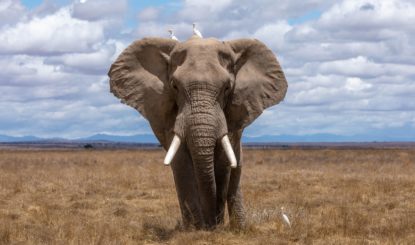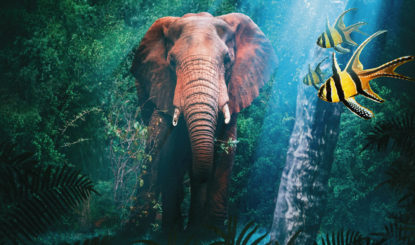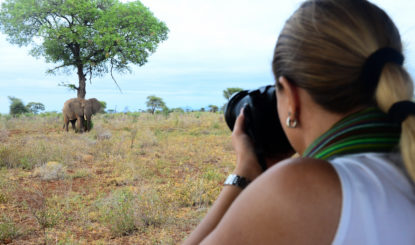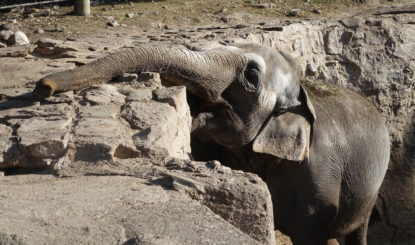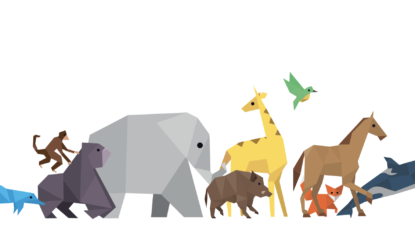Basel Zoo euthanises elephant Heri: enough is enough!
Bern, 13 June 2025 – on June 11, 2025, Basel Zoo announced the death of elephant Heri (estimated to be 49 years old), described as a ‘necessary euthanasia’ following a gradual deterioration in her health. But behind the sanitised tone of this statement lies a dark truth, which Fondation Franz Weber (FFW) strongly denounces: Heri died after carrying a dead foetus in her womb for a year and a half.
Basel Zoo euthanised the elephant Heri on 11 June 2025, after her health gradually deteriorated, without mentioning the fact that Heri had been carrying her dead calf in her womb for a year and a half. The zoo euphemistically refers to a ‘stillbirth’. However, the truth is that the foetus had already died in mid-December 2023. Heri never gave birth. She was forced to live with the remains of her baby in her womb, day after day, month after month, until her body gave up. This is not called ‘unsuccessful gestation’; it is called serious veterinary neglect with fatal consequences.
Since 2023, Fondation Franz Weber has been alerting the zoo about this, while offering the assistance of experts in elephant biology and animal welfare. Our calls have been ignored, our letters described as ‘irritating and hypocritical’. Shortly afterwards, the foetus was declared dead and Heri’s condition was critical. Since then, there has been no transparency regarding her medical care.
Diluted responsibilities, worrying justifications
Today, the zoo is downplaying the facts, claiming that the euthanasia was due to Heri’s advanced age. However, no veterinary report has been published. According to Tomas Sciolla, FFW expert in biodiversity conservation and zoo transformation, ‘the prolonged presence of a petrified foetus can cause infections, internal lesions or systemic diseases. It is highly likely that this was the main cause of her deterioration.’
In its statement, Basel Zoo attempts to absolve itself of responsibility, claiming that it does not have ‘sole decision-making power’ on the keeping of elephants, citing the coordination of the European Association of Zoos and Aquaria (EAZA) and its EEP (EAZA Ex situ Programme). It even claims that the “experts” who recently visited the facilities were ‘impressed’.
Impressed? By what? By an elderly, sick elephant carrying a mummified foetus for 18 months? By the introduction of a male infected with tuberculosis (Tusker), who was nevertheless placed in contact with the females? By the obvious tensions observed today between Rosy and Maya, the two remaining elephants, who are suffering the effects of totally artificial social structures that are contrary to the deeply matriarchal and complex nature of elephants?
Far from reassuring, this kind of response exposes a failing system where appearances matter more than the actual welfare of the animals.
Archaic management, avoidable suffering
Heri had no history of successful motherhood, had already experienced a stillbirth, and her advanced age made any attempt at reproduction particularly risky.
‘The EAZA guidelines advise against breeding older females with no previous successful births,’ explains Dr Keith Lindsay, an expert in elephant biology. ‘And yet the zoo introduced a male, Tusker, into Heri’s group without any preventive measures. It’s simply irresponsible,’ according to Dr Lindsay.
The zoo is trying to justify the unjustifiable by hiding behind committees, programmes and figures. But the facts are clear: in over 70 years, only four elephants have been born alive at Basel Zoo. None have reached old age. The last viable calf, born in the 1990s, died young.
Never again
Vera Weber, president of FFW, is shocked by the Basel Zoo’s management: “Heri died after months of silent suffering. We refuse to allow her story to be hushed up with technical terms and bureaucratic justifications. Heri was a sensitive, intelligent, social individual. She deserved better. Her story must be the last of its kind. No elephants in captivity. No artificial breeding. Not at Basel Zoo. Not anywhere else.”
Fondation Franz Weber is calling on the zoo to publish Heri’s necropsy report and, above all, to end its elephant breeding programme. A humane and swift solution must be found for Rosy and Maya. Transfer to an elephant sanctuary would be ideal.
Finally, this mismanagement raises another question: what about the other species held in captivity? The zoo plans to import manatees – marine mammals that share a common ancestor with elephants. Heri’s story must serve as a warning: before locking up other animals, we must first learn how to protect and manage those we already have. FFW is calling on the zoo to abandon this crazy idea.
Facts about Heri and elephants
- Heri was an African savanna elephant born in the 1970s in the Kruger National Park in South Africa, where she lived in the wild. She was captured and taken to European zoos. She has lived at Basel Zoo since 1988.
- Heri had already given birth to a baby elephant about 20 years ago, but the calf was stillborn.
- In early 2023, Basel Zoo announced, with obvious delight, that Heri was expecting a calf for the end of that year. Since then, FFW has repeatedly warned the zoo about the risks of this pregnancy for Heri and the calf.
- In August 2023, Tusker, the male elephant that the zoo allowed to mate with Heri, waseuthanised because he had tuberculosis (a fatal disease for elephants, which they catch in captivity through contact with infected humans or other animals). Tusker had probablybeen suffering from the disease for many months; in fact, his transfer to Basel had been delayed precisely because he had previously been in contact with infected elephants.
- In November 2023, FFW, noting that Heri’s condition appeared to be deteriorating, offered the Basel Zoo the assistance of its experts in elephant biology and animal welfare – to no avail. In a letter dated 23 November 2023, the zoo simply replied that the proposal was ‘irritating and hypocritical’.
- A few weeks later, the zoo announced the death of the baby, still in Heri’s womb, and her critical condition…
- Elephants live for 40-50 years in captivity, but can live up to 60-70 years in the wild.
- Elephants are highly social and intelligent animals. They live in herds organised into a matriarchal system, but maintain regular contact with males. They travel an average of 10 km per day in search of food, water and shelter.
- The IUCN African Elephant Specialist Group, which brings together nearly 95 experts, opposes the capture of African elephants for captivity and sees no benefit in keeping elephants in captivity for the conservation of the species in situ, i.e. for the conservation of elephants in their natural habitat.
